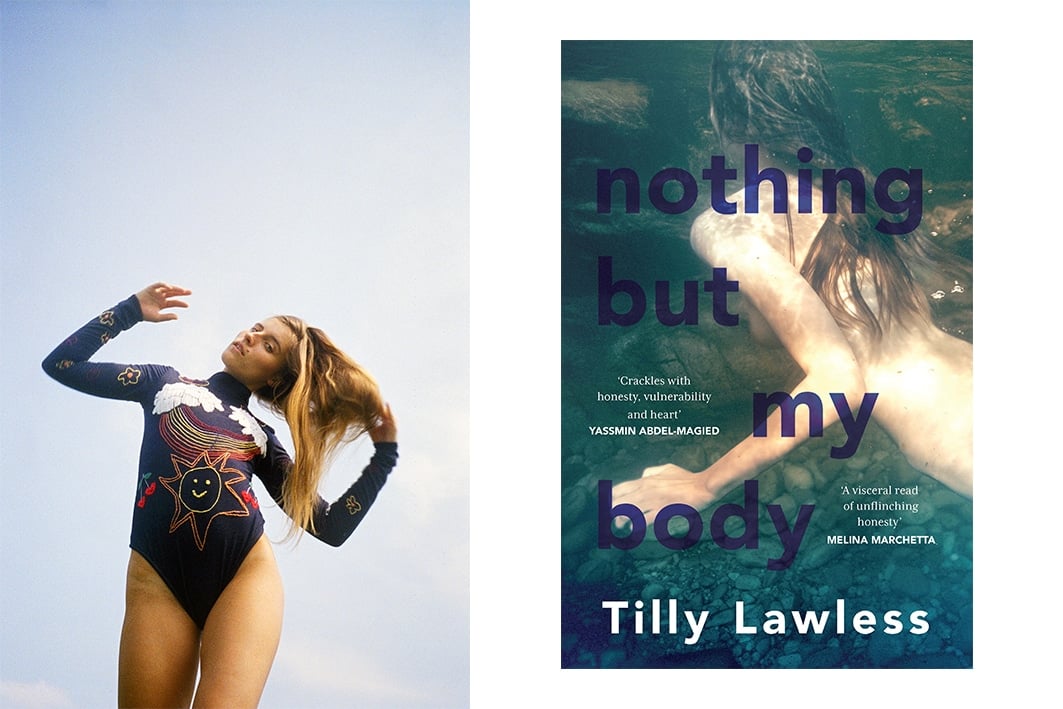
"I want you to know that you may be able to squint up inside me and count the men I have slept with, like rings in a tree, a tracing of lines that coil up and through me till I'm pricked like the tallowwoods beneath which the cows graze, yet none of them have erased where I'm from or who I am."
Tilly Lawless' debut book was always going to be a triumph. Nothing But My Body, is more than this. In a body-of-work that spans and eight day journey through the writer's life, the above excerpt only skims the top of a novel rich with moments like this, a tribute to who Lawless is, where she is from, the land she loves and the life she lives, it's all bound up together, poured onto paper with the intention of stream-of-consciousness writing.
"I found on my Instagram that the things people responded to the most, were the real immediate, emotive, train of thought base. So I was like, why not? Why not create a novel novel that was structured around a train of thought. And then I started thinking about books that did that. I thought about Mrs. Dalloway that Virginia Woolf wrote in the early 1920s, she very much had that structure. It's just the train of thought across one day, and I was like, well, why don't I do that, but I do it across a week." Lawless says.
It is writing that resonates and crawls up inside your core, jolting memories of the 2019/20 bushfires that eviscerated the eastern coast of Australia, came too close to our homes, had us pleading to anything and everything to make it end; it reminisces on the beginning of the COVID-19 pandemic, and the way it began creeping into our peripherals in February, giving us one last chance at Mardi Gras to dance with our chosen families and tell them we love them before plunging into solitude.
"I wanted to bring people back there." Lawless tells me, when I ask of her intention behind writing about the bushfires. "It was the hardest chapter to write by far. I'd gone on to finish the whole book before I could even go back and finish it because I think, for a lot of people, our generation has a complete sense of doom and bleakness when it comes to climate change. And I think, for a lot of Australians, at least ones that were directly impacted by the bushfires, that like the pandemic has been awful, but like those bushfires were on another level." She says. "And I think, speaking to friends who have never been to Australia, they could not comprehend the bushfires, they really didn't. They didn't get how absolutely catastrophic and soul destroying it was. And for me, in writing that chapter I think I wanted to instil it very much with a sense of how we were feeling in that time. Because I felt like we were just really, really overlooked on a global scale. So yeah, I do think I maybe had an agenda in writing that chapter."
She writes about the land she grew up on, tucked away in the valley behind Bellingen, NSW, and Sydney, the city she lives in, with familiarity and specificity. For the Australian reader who grew up in the country, it is our own memories when she writes, "For them there is no desperate searching for dock leaves to abate the sting of nettles; there are no farmers' friends to be pulled out of school socks every morning; no cuts on hands from pulling yourself up the river on your belly, one handful of reeds at a time." For those in the metropolis, streets and curbs and landmarks are familiar. For those overseas, it is a world of discovery, a roadmap of the lushness so-called Australia offers.
"I definitely wrote it with an awareness of an international reader, because I felt like we read so much literature that is set in New York and London and it's really acceptable to have specific details that mentions cafes and streets in those places. And as Australian readers, we read those, and we just know so much about these cities." Lawless notes on writing about home.
"I feel like when you write something that's really tied to Sydney, or tied to a small town in Australia, international readers see that as true. So for me, I was like, 'why can't we write about Sydney with the same specificity?' You know? That's why I kept it so Australian. And I deliberately mentioned small towns of like, 200 people because I also wanted Australian readers to be able to read about regional New South Wales to be able to feel like they/it existed in the art world, you know?"
It is also personal in a way that many of us, especially those known on social media, could feel vulnerable putting into the world. We know Tilly. We know her from her sprawling captions on Instagram that detail a work booking or a queer party she has attended, her love life, her hometown. We don't actually know her. Nothing But My Body affirms this. Fragments of Instagram captions are interspersed throughout chapters, and for those who pay attention, it jolts us into the realisation that we never really knew her, not like this, and we still probably don't. "I am so used to being so transparent online, that it didn't feel any different." Lawless explains when I ask her what it's like to put more of herself into the world in the way that Nothing But My Body has. "And maybe it will when it actually comes out in hardcopy, and maybe people read it who wouldn't read my Instagram, like a different demographic. But at the moment, I haven't felt any more exposed than I already felt." She says. "And I think also, because not all of its true as well, in that I put it in a fiction structure. And there are parts that are made up, and there are parts that are true, but the sequence has changed, it's all chopped up a bit. I feel slightly protected from that in a way that I haven't been on Instagram."
It may reach other folks, too, as Lawless mentions. Folks that need affirmation that queer relationships are often as messy as hetero relationships and that the lesbian utopia we are all sold, while nice, isn't always reality. Things break, people are flawed, sometimes our love and generosity of spirit aren't always met with U-Hauls and animal adoptions but instead the kind of messiness that we don't want to talk about because it will puncture the illusion we're desperately clinging to, and even more desperate to show the world. Sometimes the homes we inhabit together aren't safe and the words of your partner are cruel or vacant, all the things The L-Word never quite managed to unpack, but writers like Lawless and Carmen Maria Machado, do, even if accidentally. "I definitely didn't deliberately do that." She says when I ask about her portrayal of past relationships, and how it rose to meet this somewhat unchartered space. "But I would love if if people read my book and felt that way. I didn't actually go into it being like, 'I want to show that domestic violence is overlooked in queer relationships' and things like that. I do agree, all those things need greater visibility on them. But it wasn't a conscious intent when I was writing it." She concludes. "Unfortunately, like a lot of the influences we get online, queer influencers are always presenting their relationships in this, as you said, kind of utopia. And it's like, why do we think that lesbian relationships have to be perfect in a way that straight relationships aren't?" She says, referencing Machado's In The Dream House, "In The Dream House really brought that home for me."
Nothing But My Body is a knockout on all fronts, meeting the reader with the vigour and enthusiasm of a debut - ready to be poured over and lapped at, and according to Lawless, it's only just the beginning. "I've actually written a second book." She announces when I ask the classic question of what's next. "Hopefully, it'll get picked up. It's so funny, because people are like, 'oh, there's always pressure to write a second book after your first', so I was like, 'I better fuckin' write the second book before the first one comes out.' I've tricked the system." she says triumphantly. "I finished it a few months ago, it's with my agent now, but it's a magical realism novel set in 2009, in northern New South Wales. And it's about three girls in high school. Two of whom a gay or queer whatever you want to call it. I mean, at that time, the terminology was definitely more gay. It's about their respective relationships with their mothers." She explains. "It was really really fun to write because I just put in like, every single reference you can think of from going to high school in that time, like, impulse deodorant, and Death Cab for Cutie and I just felt like that was really fun."
Lastly, I wanted to know what scares Lawless from a writing perspective when her vulnerability appears to come so naturally. "When I go through periods of not writing at all, I feel like anyone who creates things has this fear that like, 'Oh, have I lost it? Will I never be able to create again?' And I mean, I went through that when we first went into this lockdown. In the first three weeks, I had so much time to write and I wasn't writing it. It was making me depressed that I wasn't writing that I was wondering if I'd I never write again. I always go through that fear that you've somehow just gone to sleep and woken up in the morning and lost the ability to do what you used to be able to do. But I feel like that's just like a self doubt that comes with it." She says. "I guess, maybe one thing that scares me, is that the thing about my Instagram is that obviously, people are only reading my writing on there if they've chosen to follow me. And I think I don't like the idea with the book is like, suddenly there'll be people reading it who hate it, which is fine. But they might feel entitled to tell me that they hate it. Whether in like reviews, or comments or things like that. And I mean, I don't care if people hate it, but like, do I need to read that you hate it?"
Nothing But My Body was released on Tuesday, August 3, and is available to order now, here.



